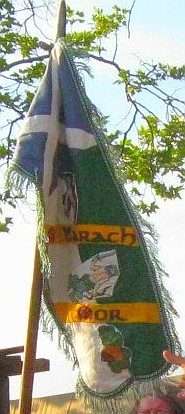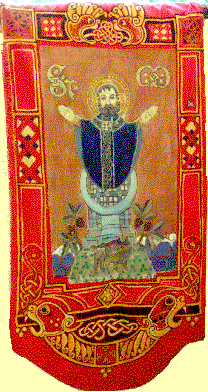Rallying Cry
"An Darach Mor" ("The Great Oak")- much used in marches.Motto and Slogan (Sluggan) or War Cry
"Demimid iarract niòs fearr" transliterated: "We do the attempt more better" or "We try harder."Plant Badge
The Oak. Anyone may wear oak leaves as a cap badge, and the oak leaf and acorn designs are favorites for crafts and decorations.Animal Badge
The Selkie (or Silkie), legendary water creature who swims the sea in a sealskin but may take it off and walk upon the earth as a man. A selkie was the traditional ancestor of the Colin line, and therefore of our Clan. We neither kill nor eat seals, though others in the 16th century commonly did so.
Clan BadgeOur clan badge is a Selkie (or Silkie), with sealskin on lower half, bearing sword, bow, and arrows in a wreath of oak leaves. The wreath is used instead of the belt to avoid offending members of some clan societies |
|
Other Badges, etc.Areas of responsibility within the Clan (catering, water carriers, medics, etc.) may wear appropriate tokens or ribbons. The Clan has established awards of merit, but these and other awards are only worn at 20th-century events. |
Banners
| We carry the national flags of St. Andrew and St. Patrick on marches: St. Andrew's Cross, for Scotland, is a white saltire (diagonal cross) on a blue field; St. Patrick's Cross is a white saltire on a red field. |

| The Chief has a personal banner bearing his motto and his personal arms. Households also have their own banners. We also carry our own painted and embroidered Saints banners of Saint Patrick, Saint Andrew, and Saint Maolrubha, our patron saint.
|
 |
Clan Surname
These were not used in the 16th century, either. Our personas, the theatrical characters we each develop, use patronymics ("mac Ciaran" -son of Ciaran; "nic Eoghann" -daughter of Eoghann) and descriptive names ("Iain Ruadh" - Red Iain; "Mairi Og" - Young Mary) in addition to our given names. Only the son of a man named Colin would use the name "mac Colin".Events and Celebrations of Note
We have a very full year, with meetings not involving an event when we can. Burns Night is an event for poetry, and St. Patrick's Day never goes unnoticed. Our own patron Saint Maolrubha has holidays in both April and August, apropos to a Saint known for curing the insane. Every spring we remember our dead, as fits a family that Christens, marries, and buries its own, and every such occasion marked by a celebration. We participate in several Fairs throughout the year.Hogmanay
We celebrate Hogmanay (New Year) with an annual Victorian feast in full formal Victorian dress. This is where the Chief gives the State of the Clan Address, and it also serves as our formal awards banquet.
Renaissance Faire
The single most significant event of our year is our participation in the annual Renaissance Faire, now held in Devore. It dominates our calendar with planning for it from early in the year, and continues as the major consideration until tare down ends in June. It is our single largest exposure as a theatrical group, with about three stage shows a day, and continuous craft demonstration through the day.
Other Traditions
Traditions are a constant part of the process of living. You will often hear the line "Once by accident, twice by habit, three times by tradition." This reflects human nature, then and now.We eat by precedence, with the Chief served first, the daoine uasail (Household heads and Gentles) next, and the rest of us, though if dinner is late we may serve the children first, by his order.
 Clan Tartan
Clan Tartan
